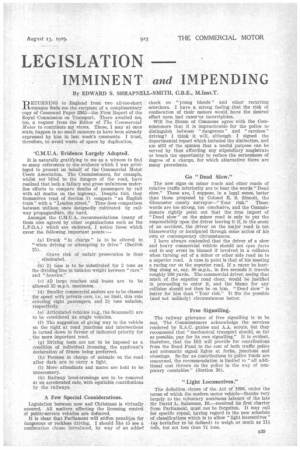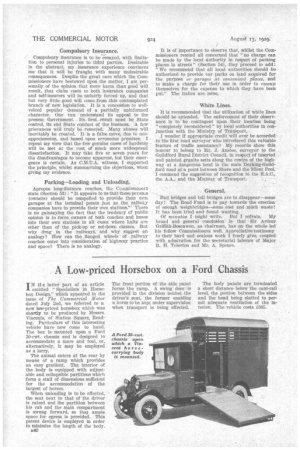LEGISLATION IMMINENT and IMPENDING By EDWARD S. SHRAPNELL-SMITH, C.B.E., M.Inst.T.
Page 65

Page 66

If you've noticed an error in this article please click here to report it so we can fix it.
RETURNING to England from two all-too-short' voyages finds me the recipient of a complimentary copy of Command Paper 3365—the First Report of the Royal 'Commission on Transport. There awaited me, too, a request from the Editor of The Commeretal Motor to contribute my views. These, I may at once state, happen in no small measure to have been already expressed by him in last week's comments. I trust, therefore, to avoid waste of space by duplication.
'C.M.U.A. Evidence Largely Adopted.
It is naturally gratifying to me as a witness to find so many references to the evidence which I was privileged to present on behalf of the Commercial Motor. Users Association. The Commissioners, for example, whilst not blind to the dangers of the road, have realized that both a fallacy and gross unfairness underlies efforts to compare deaths of passengers by rail with all deaths on the highway. Despite this, they themselves (end of Section 7) compare "an English train" with a "London street." Thus does comparison between unlikes, once designedly cultivated by railway propagandists, die hard.
Amongst the C.M.U.A. recommendations (many of them also agreed by other organizations such as the L.P.O.A.) which are endorsed, I notice those which cover the following important points :—
(a) Drunk "in charge " is to be altered to "when driving or attempting to drive (Section 25).
Grave risk of unfair prosecution is thus eliminated.
.(b) 24 tons is to be substituted for 2 tons as the dividing-line in unladen weight between " cars " and " heavies."
(c) All large coaches and buses are to be allowed 35 m.p.h. maximum.
(d) Smaller, commercial motors are to be classed for speed with private cars, Le., no limit, this rule covering eight passengers, and 24 tons unladen,
respectively.
(e) Articulated vehicles (e.g., the Seammell) are to be considered as single vehicles.
(f) The suggestion of giving way to the vehicle on the right at road junctions and intersections is turned down in favour of indicated priority for the more important road.
(g) Driving tests are not to be imposed as a Condition of individual licensing, the applicant's declaration of fitness being preferred.
(h) Persons in charge of animals on the road after dark are to carry a light.
(1) More attendants and mates are held to be unnecessary.
(k) Railway level-crossings are to be removed at an accelerated rate, with equitable contributions by the railways.
A Few Special Considerations.
Legislation between now and Christmas is virtually assured. All matters affecting the licensing control of public-service vehicles are deferred.
It is clear that Parliament will stiffen penalties for dangerous or reckless driving. I should like to see a confiscation clause introduced, by way of an added check on "young bloods" and other recurring scorchers. I have a strong feeling that the risk of confiscation of their motors would have the desired effect upon bad cases or incorrigibles.
Will the House of Commons agree with the Commissioners that it is impracticable for the police to distinguish between " dangerous" and " careless " driving? I think it will, although _ I signed the departmental report which included the distinction, and am still of the opinion that a useful purpose can be served by thus affording any stipendiary magistrate or bench the opportunity to reduce the seriousness of degree of a charge, for which alternative there are many precedents.
Go "Dead Slow."
The new signs on minor roads and other roads of relative traffic inferiority are to bear the words "Dead slow." These are, I suppose, in a legal sense, better than those proposed by Colonel E. S. Sinnott, the Gloucester county surveyor—" Your risk." Those words are too strong, too conclusive, and the Commissioners rightly point out that the true import of "Dead slow" on the minor road is only to put the responsibility upon the driver leaving it if, in the event of an accident, the driver on the major road is not blameworthy or inculpated through some action of his own or contemporary circumstances.
I have always contended'. that the driver of a slow and heavy commercial vehicle should not ipso facto and in any event be blamed if involved in a collision vvben turning out of a minor or other side road on to a superior road. A case in point is that of his meeting a racing car on the superior road. If a racer be hurtling along at, say, 80 m.p.h., in five seconds it travels roughly 200 yards. The commercial driver, seeing that much of the superior road clear, would be justified in proceeding to enter it, and the blame for any collision should not then be on him. "Dead slow" is better for him than "Your risk." It fits the possible (and not unlikely) circumstances better.
Free Signalling.
The railway grievance of free signalling is to be met. The Commissioners acknowledge the services rendered by R.A.C. guides and A.A. scouts, but they recommend that "mechanical transport should, so far as possible, pay for its own signalling." It is evident, therefore, that the Bill will provide for contributions from the Road Fund to the cost of both traffic police aad automatic signal lights at forks, junctions and crossings. So far as contributions to police funds are concerned, the recommendation is limited to "all additional cost thrown on the police in the way of temporary constables " (Section 36).
"Light Locomotives."
The definition clause of the Act of 1896, under the terms of which the modern motor vehicle—thanks very largely to the voluntary assiduous labours of the late Sir David L. Salomons, Bt.—received its first charter from Parliament, must not be forgotten. It may call for specific repeal, having regard to the new schedule of classifications which is to allow "light locomotives" (as hereafter to be defined) to weigh as much as 114 toils, but not less than 7+ tons. Compulsory Insurance.
Compulsory insurance is to be essayed, with limitation to personal injuries to third parties. Desirable in the abstract, my insurance experience convinces me that it will be fraught with many undesirable consequences. Despite the great care which the Commissioners have bestowed upon the matter, I am personally of the opinion that more harm than good will result, that claim costs to both insurance companies and self-insurers will be unfairly forced up, and that hut very little good will come from this contemplated branch of new legislation. It is a concession to wellvoiced popular demand of a partially uninformed character. One an understand its appeal to the present Government. Its first result must be State control, its end State conduct of the business. A few grievances will truly be removed. Many abuses will inevitably be created. It is a false move, due to misapprehension, and based upon erroneous premises, I repeat my view that the few genuine eases of hardship will be met at the cost of much more widespread dissatisfaction. It may take five or seven years for the disadvantages to necome apparent, but their emergence is certain. As C.M.I.J.A. witness, I supported the principle, whilst summarizing the objections, when giving my evidence.
Parking—Loading and Unloading. ,
Apropos long-distance coaches, the C..:mraissiooera state (Section 53) : "It appears to us that these peraoas (owners) should be compelled te provide their own garages at the terminal points just as the railwi-y companies have to provide their own stations.": There is no gainsaying the fact that the tendency of public opinion is to force owners of both coaches and buses into their own stations in all cases where halts are other than of the pick-up or set-down classes. But why drag in the railways, and why suggest an analogy? How can the flanged wheels of _railway' coaches enter into consideration of highway practice and space? There is no analogy. It is of importance to observe that, whilst the Commissioners remind all concerned that "no charge can be made by the local authority in respect of parking places in streets" (Section 54), they proceed to add: "We recommend that all local authorities should he authorized to provide car parks on land acquired for the purpose or garages al convenient places, and to make a charge for their use in order to recoup themselves for the expense to which they have been put." The italics are mine.
White Lines.
It is recommended that the utilization of white lines should be extended. The enforcement of their observance is to be contingent upon their location being " completely reconsidered" by local authorities in conjunction with the Ministry of Transport.
I wonder if appropriate credit will ever be accorded to the first road surveyor who introduced this valuable feature of traffic assistance? My records show this honour to belong to Mr. J. Anstee, surveyor to the Guildford Rural District Council, in respect of inserted and painted granite setts along the centre of the highway at a dangerous bend in the main Dorking-Guildford road at a point between Sliere and the Silent Pool. I commend the suggestion of recognition to the R.A.C.,
the A.A., and the Minister of Transport. -fl General.
Bad bridges and toll bridges are to disappear some day ! The Road Fund is to pay towards the erection of enough weighbridges—some cost and much waste! It has been tried andfound wanting.
Of minutire I might write. But I refrain. My broad and general conclusion is that Sir Arthur Griffith-Boscawen, as chairman, has on the whole led his fellow Commissioners well. Appreciative testimony to their hard and zealous work I freely give, coupled, with admiration for the secretarial labours of Major R. H. Tolerton and Mr. A. Spence.




















































































































